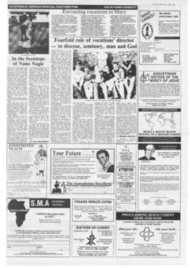Page 6, 22nd April 1988
Page 6

Report an error
Noticed an error on this page?If you've noticed an error in this article please click here to report it.
Tags
Share
Related articles
Tutu Backs Church Group
Giving Flesh To Rhetoric
News In Brief
Tutu's Meeting With Pope Poses Problem For Sa Authorities
Apolitica Pontiff
Private face of Tutu
Tutu: Voice of the Voiceless, by Shirley du Boulay (Hodder and Stoughton, £12.95).
DESMOND Tutu is easily the most recognisable black South African alive today. Oliver Tambo and Allan Boesak could probably walk through shopping centres in Birmingham (or even Birmingham, Alabama) without being noticed, and only the privileged few have any idea what Nelson Mandela looks like nowadays.
Tutu is different. Apart from being a world-famous archbishop and champion of civil rights, he also appears to be good company. There are worse people I could imagine being stuck in a lift with. As such, any biography of Tutu should aim to address the all-important question of "what's he really like?"
Shirley du Boulay manages to supply a fairly satisfactory picture of the private Tutu, who emerges as an even more charming and dedicated person
than he appears on television. One or two incidents she discloses are slightly disturbing, though, like when he visits a colleague in hospital but audibly criticises the nurses for not recognising who he is.
Tutu emerges from the biography as a pained, frustrated but somehow ever cheerful figure in the midst of poverty and suffering. His political position is made completely clear, and the record is put straight on various misconceptions which have arisen (often from misquotes).
He does not support 'violence but does support the objectives of the ANC. He has objections, though only minor ones, to the Kairos document and still believes that a negotiated settlement to South Africa's problems is just about possible.
His relations with the black consciousness movement are properly emphasised, as are his beliefs on reconciliation and confrontation.
He insists; "The freedom of the white man is inextricably bound up with that of the black man. So long as the black man is dehumanised and unfree, so too will the white man remain dehumanised and unfree because he will be plagued by fear and anxiety."
His development from disinterested student to activist archbishop is charted in some detail, from the early influence of Trevor Huddleston (who used to visit the young Desmond, sick in hospital with TB) to the recent clashes with the South African government over his passport and right to travel.
Tutu's influence overseas is also highlighted and an impressive list of awards he has been given by the international community appears at the end of the text (including the Nobel Peace Prize of 1984 and the Freedom of the City of Merthyr Tydfil in 1986).
Following State President Botha's personal threats to the Archbishop of Cape Town last month, Desmond Tutu's physical safety may depend on how high a profile he can maintain outside South Africa. Get this book and help keen him
famous. Brian Dooley
blog comments powered by Disqus











